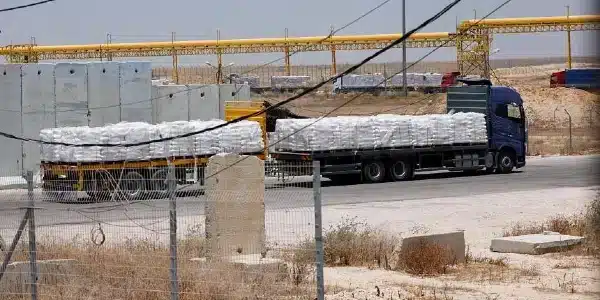Israel’s military announced on Sunday that it will “pause” its operations around a route in southern Gaza daily to facilitate aid deliveries. This comes after months of warnings about famine in the besieged Palestinian territory.
The “local, tactical pause of military activity” during daylight hours in Rafah was declared following a day of heavy losses for the Israeli army, including the deaths of eight soldiers in an explosion near the southern city and three more troops in other incidents.
U.N. agencies and aid organizations have continuously raised alarms about severe shortages of food and essential supplies in Gaza, worsened by land access restrictions and the closure of the Rafah crossing with Egypt since Israeli forces took control in early May.
Israel maintains that it has been trying to allow aid into Gaza through the Kerem Shalom crossing near Rafah, blaming militants for looting supplies and humanitarian workers for distribution failures.
The military announced that the pause would occur daily from 8:00 am to 7:00 pm local time along a designated route from the Kerem Shalom crossing to Salah al-Din road and then northwards. This humanitarian corridor extends to Rafah’s European Hospital, about six miles from Kerem Shalom.
This announcement coincided with the celebration of Eid al-Adha among Muslims worldwide. In northern Gaza’s Jabalia refugee camp, Umm Muhammad al-Katri expressed the somber mood, stating, “This Eid is completely different. We’ve lost many people, there’s a lot of destruction. We don’t have the joy we usually have. I came to the Eid prayers mourning. I’ve lost my son.”
Despite the pause, the Israeli military emphasized that there was “no cessation of hostilities in the southern Gaza Strip.” The pause is intended to “increase the volumes of humanitarian aid” following discussions with the U.N. and other organizations.
The U.S., which has been pressing Israel and Hamas for a ceasefire, recently sanctioned an extremist Israeli group for blocking aid convoys to Gaza. The eight Israeli soldiers killed on Saturday were struck by an explosion while traveling in an armored vehicle near Rafah, with military spokesman Rear Admiral Daniel Hagari attributing the blast to an explosive device or an anti-tank missile.
Additionally, two soldiers died in northern Gaza, and another succumbed to wounds from earlier fighting. Abu Obaida, spokesman for Hamas’s military wing, vowed to “continue our painful strikes against the enemy wherever it may be.”
Saturday’s casualties brought the Israeli military’s death toll to 309 since launching its ground offensive in Gaza on October 27. Prime Minister Benjamin Netanyahu offered condolences and reiterated the need to achieve the war’s objectives despite the heavy losses.
Israel’s offensive follows Hamas’s unprecedented October 7 attack, which reportedly killed 1,194 Israelis and saw 251 hostages taken, with 116 still in Gaza. Israel’s retaliatory strikes have resulted in at least 37,296 deaths in Gaza, mostly civilians, according to Gaza’s health ministry.
World Food Program deputy executive director Carl Skau highlighted the challenges of delivering aid amidst the lawlessness and active conflict in Gaza. G7 leaders called for unrestricted humanitarian relief access, stressing the need for aid agencies to operate unhindered.
Mediators from Egypt, Qatar, and the U.S. are pushing for a new Gaza truce after a one-week pause in November facilitated hostage exchanges and increased aid deliveries. Hamas demands a complete Israeli withdrawal from Gaza and a permanent ceasefire, which Israel has consistently rejected.
U.S. Secretary of State Blinken stated that Israel supports the latest ceasefire plan, but Netanyahu has not publicly endorsed it due to opposition from his far-right coalition partners. National Security Minister Itamar Ben Gvir criticized the military’s humanitarian pause as a “crazy and delusional approach.”
Meanwhile, fears of a broader Middle East conflict have been fueled by escalating violence between Israel and Hezbollah, with both sides engaging in intense strikes. U.N. officials in Lebanon warned of the high risk of miscalculation leading to a wider conflict, urging all sides to cease fire.


